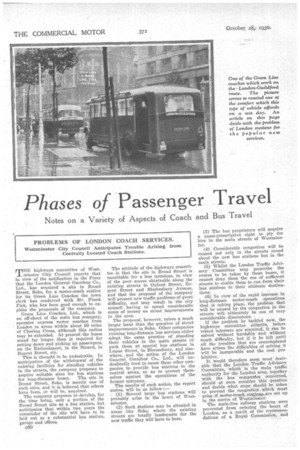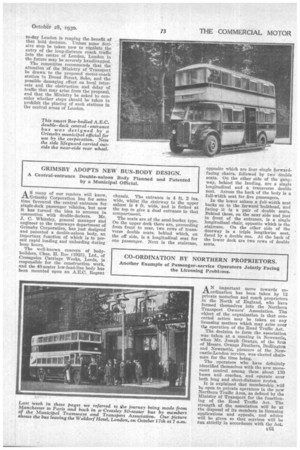Phases of Passenger Travel
Page 118

Page 119

If you've noticed an error in this article please click here to report it so we can fix it.
Notes on a Variety of Aspects of Coach and Bus Travel
PROBLEMS OF LONDON COACH SERVICES.
Westminster City Council Anticipates Trouble Arising from Centrally Located Coach Stations.
THE highways committee of Westminster City Council reports that in view of the notification in the Press that the London General Omnibus Co., Ltd., has acquired a site in Broad Street, Soho, for a motor-coach station for its Green Line Coaches the town clerk has conferred with Mr. Frank Pick, who has been good enough to explain the proposals of the company. Green Line Coaches, Ltd., which is an off-shoot of the main bus company, Operates express motor coaches from London to areas within about 20 miles of Charing Cross, although this radius may be extended. At present the buses stand far longer than is required for setting down and picking up passengers, on the Embankment, in the Strand, in Regent Street, etc.
This is thought to be undesirable. In anticipation of the withdrawal of the existing facilities for standing vehicles in the streets, the company proposes to acquire suitable sites for bus stations for long-distance buses. The site in Broad Street, Soho, is merely one of such sites, and it is believed that others have been, or will be, acquired.
The company proposes to develop, for the time being, only a portion of the Broad Street site as a bus station, but anticipates that within two years the remainder of the site will have to be laid out as a substantial bus station, garage and offices.
C60 The attitude of the highways committee is that the site in Broad Street is unsuitable for a bus terminus, in view of the poor access obtainable along the existing streets to Oxford Street, Regent Street and Shaftesbury Avenue, and that the proposal of the company will present new traffic problems of great difficulty, and may result in the city council having to spend considerable sums of money on street improvements in the area.
The proposal, however, raises a much larger issue than the question of street improvements in Soho. Other companies running long-distance bus services either adopt the same practice of standing their vehicles in the main streets or park them at special bus stations in Lupus Street, in Bloomsbury, and elsewhere, and the action of the London General Omnibus Co., Ltd., will undoubtedly tend to cause these other companies to. provide bus stations in the central areas, so as to protect themselves against the operations of the former company.
The results of such action, the report states., will be as follow :—
(1) Several large bus stations will probably arise in the heart of Westminster.
(2) Such stations may be situated in areas like Soho, where the existing streets are totally inadequate for the new traffic they will have to bear. (3) The bus proprietors will acquire a quasi-prescriptive right to ply, for hire in the main streets of 'Westminster. . (4) Considerable congestion will be caused not only in the streets round about the new bus stations but in the main streets.
(5) Whilst the London Traffic Advisory . Committee may prescribe the routes to be taken by these buses, it cannot deny them the use of sufficient ,streets to enable them to run from their bus stations to their ultimate destinations.
(6) In view of the rapid increase, in long-distance motor-Coach .operations that is taking place, the problem that will be caused by the congestionl in the streets will •ultimately , be one of very
considerable ,dimensions. . . .. If the problem 'be tackled, now, the hightfrays committee, sabaiits, before veked interests' are acquired, it can be solvedwithout hardship and without much difficulty, but if it be left until all the troubles that are contemplated have arisen the difficulties of solving it will be insuperable and the cost pre hibitive.
It would therefore seem most desirable that the London 'Traffic AdVisory .Committee, W hi c h is the main .traffic .authority for the London area, together with the bus companies' concerned, should at .once consider 'this, question and decide what steps should be taken to prevent the congestion whichmust arise motor-coach stationaAre Set 'up in the centre of Westminster.
The main-line railway stations were prevented from entering the heart of London, as a, result of the recommendations of a Royal Commission, and
to-day London is reaping the .benefit of that bold decision. Unless some decisive step be taken now to regulate the entry of the long-distance coach traffic into the centre of London, London in the future may be severely handicapped.
The committee recommends that the attention of the Ministry of Transport be drawn to the proposed motor-coach station in Broad Street, Soho, and the possible damaging effect on local interests and the obstruction and delay of traffic that may arise from the proposal, and that the Ministry be asked to consider whether steps should be taken to prohibit the placing of such stations in the central areas of London.




















































































































































































